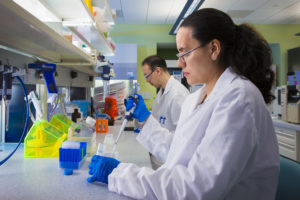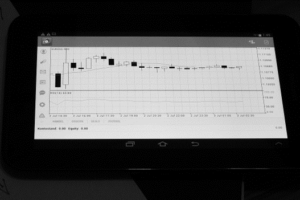REGN-EB3 is a novel anti-viral antibody cocktail developed using the same rapid response technologies as REGN-COV2, Regeneron’s investigational COVID-19 antibody cocktail

Tarrytown-based Regeneron Pharmaceuticals announced that the Biomedical Advanced Research and Development Authority (BARDA), part of the Office of the Assistant Secretary for Preparedness and Response within the U.S. Department of Health and Human Services (HHS), has entered into an agreement to procure REGN-EB3 as part of the HHS’ goal of building national preparedness for public health emergencies.
REGN-EB3 is Regeneron’s investigational triple antibody cocktail treatment for Ebola virus infection and is currently under Priority Review by the U.S. Food and Drug Administration (FDA), with a target action date of October 25, 2020. Contingent on FDA approval, Regeneron expects to deliver an established number of treatment doses over the course of six years and receive compensation of approximately $10 million in 2021 and an average of $67 million per year for each of the next five years (2022-2026).
“Developed using Regeneron’s proprietary VelociSuite® rapid response technologies, REGN-EB3 was shown to save lives in the PALM trial, which evaluated multiple therapies against the previous standard of care for Ebola,” said Leonard S. Schleifer, M.D., Ph.D., Co-Founder, President and Chief Executive Officer of Regeneron. “Regeneron’s thirty years of investment in our technology and people enabled the development of REGN-EB3, which reinforces the importance of having at-the-ready tools to fight emerging pathogens. As we push through the current COVID-19 pandemic, it’s important for governments and industry to ensure preparedness for the next global health crisis by continuing to invest in innovative science and broad manufacturing capacity.”
“The current COVID-19 pandemic provides an important lesson in preparation for potential biological threats to our nation’s health security,” said BARDA acting director Gary Disbrow, Ph.D. “REGN-EB3 is the result of years of collaboration, which demonstrates the fundamental value of public-private partnership in protecting Americans from global epidemics. Whether the next one is another coronavirus, an Ebola virus or a completely novel disease, we must do everything we can to be prepared.”
In 2019, the randomized controlled PALM clinical trial conducted in the Democratic Republic of the Congo was stopped early when preliminary results showed that REGN-EB3 crossed the pre-specified superiority threshold for preventing death compared to the control arm, ZMapp®. REGN-EB3 demonstrated superior efficacy compared to ZMapp across multiple measures, including reduced mortality and fewer days until the Ebola virus was no longer detected in the bloodstream. During the trial, there were three serious adverse events for REGN-EB3, compared to seven for ZMapp.
For a previous story on the PALM trials, click HERE.






